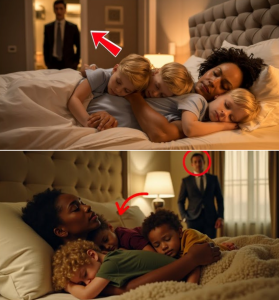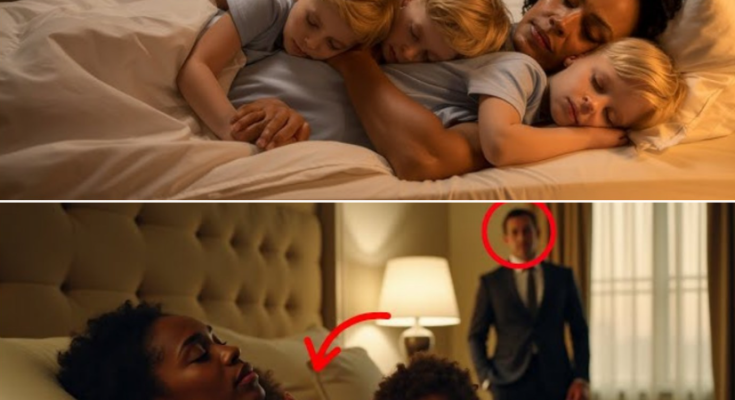The Woman Who Stayed
In the sprawling Leon estate, nestled atop the hills of Bel Air, silence was a luxury no one could afford. The mansion, a marvel of glass and steel, echoed with the chaos of three unruly boys—triplets born into wealth but starved of peace. Their father, billionaire tech mogul Julian Leon, had built empires with code and charisma, but at home, he was a man drowning in grief. His wife, Celeste, had died two years prior, and since then, seventeen professional nannies had come and gone. Some lasted hours. None survived a full day.
The triplets—Kai, Kieran, and Knox—were brilliant, wild, and broken. They were seven years old and had mastered the art of emotional warfare. Screaming matches, pranks, tantrums, and eerie silences filled the halls. Julian tried everything: child psychologists, elite caregivers, even military-trained disciplinarians. Nothing worked. The boys didn’t need control. They needed healing.
Then came Xenia Alice.
She arrived without fanfare. No Ivy League credentials. No glowing references. Just a quiet confidence and a résumé that included working with foster children and volunteering at grief counseling centers. She was Black, soft-spoken, and wore her natural curls like a crown. The agency had warned her: “They’ll chew you up.” She smiled and said, “I’ve worked with kids who’ve seen worse than monsters under the bed.”
Julian was skeptical. But desperation has a way of opening doors.
Her first day began like all the others—with chaos. Knox locked himself in the pantry and refused to come out. Kieran threw a tantrum over breakfast. Kai refused to speak. Xenia didn’t flinch. She sat on the floor, outside the pantry, and began to hum. A soft, soulful tune. Within minutes, Knox opened the door. “That’s my mom’s song,” he whispered.
Xenia nodded. “It’s mine too.”
She didn’t try to fix them. She listened. She let them scream. She let them cry. She didn’t punish them for their pain. She validated it. She taught them to name their emotions. She brought in art supplies and let them paint their nightmares. She read them stories about kids who felt lost and found their way. She cooked with them, danced with them, and when they misbehaved, she didn’t yell—she asked, “What are you trying to tell me?”
Julian watched from the shadows. He saw his sons laugh for the first time in months. He saw them hug her. He saw Kai speak again. He saw Kieran sleep through the night. He saw Knox draw a picture of their family—with Xenia in it.
He asked her one night, “How did you do it?”
She looked at him, eyes full of quiet fire. “I didn’t do anything magical. I just stayed.”
Xenia knew what abandonment felt like. She’d lost her mother to cancer at twelve. She’d bounced between relatives who saw her as a burden. She’d learned early that love wasn’t loud—it was consistent. She brought that consistency into the Leon mansion. She didn’t leave when things got hard. She didn’t flinch when the boys tested her. She stayed.
The media caught wind of the story. “Billionaire’s Triplets Tamed by Unlikely Hero.” They called her a miracle worker. She hated that. “I’m not a miracle,” she told one reporter. “I’m just someone who didn’t give up.”
But her presence did more than heal the boys. It changed Julian. He began to talk about Celeste again. He joined the boys for dinner. He laughed. He cried. He apologized. He started therapy. He stopped hiding behind boardrooms and began showing up in playrooms.
One evening, Knox asked, “Are you gonna be our mom now?”
Xenia knelt down. “I’ll always be someone who loves you. That’s enough for now.”
Julian watched her with awe. She wasn’t just a nanny. She was a force. A woman who turned grief into grace. A woman who reminded him that healing doesn’t come from control—it comes from compassion.
Months passed. The boys flourished. The mansion, once a fortress of sorrow, became a home. Xenia stayed. Not because she had to. But because she chose to.
And in choosing to stay, she did what no one else could: she gave three broken boys the one thing they’d lost—hope.


